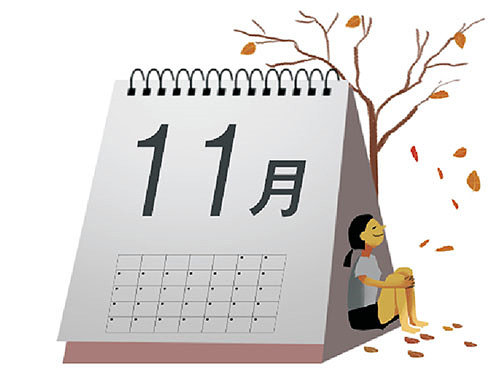Excuse for November
Excuse for November
Posted November. 09, 2019 08:09,
Updated November. 09, 2019 08:09

November is the month with deepening autumn and leaves turning red and yellow. There isn’t much rain or snow and temperatures are crisp with the average temperature in Seoul at 6.3 degrees Celsius, 12.1 in Jeju Island, and 3.4 in Pyongyang. Friday was “Ipdong,” which signals the onset of winter based on the traditional East Asian calendars that divide a year into 24 solar terms. However, cold air will be felt only when November 22, “Soseol,” arrives. It is a good season to enjoy outdoor activities.
However, November is often regarded as underwhelming. There is no holiday in the month. Some joke that “No” of November indicates that the month has nothing to offer. It’s also the second to the last month of a year, which lacks the quality of celebrating the end of a year. One could point to the “Pepero Day,” which is the day that couples give each other chocolate-dipped cookie sticks on November 11. However, some are not enthusiastic about the commercial feel of the holiday and argue that it should be changed to “Garae-tteok Day,” a type of South Korean rice cake, to promote the consumption of home-grown produce. In fact, November 11 is Farm Workers’ Day in the country as combining the two Chinese characters representing number 11 results in a character that means soil. The South Korean government set the date as a legal commemorative day in 1997 to pay respect to farmworkers who are born in the soil, spend their whole life on the soil, and return to the soil at the end.
It’s not just farmers whose lives begin and end in the soil. Genesis 3:19 in the Bible – “By the sweat of your brow you will eat your food until you return to the ground, since from it you were taken; for dust you are and to dust you will return” – reminds us that all humans are fated to death eventually.
In the Western tradition, November is the month to reflect on death and pray for the repose of the dead. The Latin phrase “memento mori,” which means “remember that you must die,” is not words of curse, rather it is a reminder of how life and death are one and the importance of being here now with gratefulness. Ancient Roman generals made their fellow soldiers repeatedly shout the epigram during marches. The Celts held a festival to celebrate death and ghosts on October 31 and welcomed November, which was regarded as the beginning of a year by the ancient ethnic group. This was the origin of Halloween Day, on which ghosts, bats and others that usually symbolize death or misfortune are celebrated with joy and positive energy in life is restored by facing death in such a manner.
November, which is October in the lunar calendar, has been traditionally considered to be a divine month by Koreans. A 1946 book written by Choi Nam-sun that includes a wide range of facts about the Joseon Dynasty wrote, “This is the month enjoyed by both gods and humans. It is considered to be the best month of a year.” Ancient East Asian dynasties, such as Goguryeo and Mahan, all held their harvest ceremony in November. In shamanism, certain rituals for villages and the spirits of the earth are conducted in the month as well.
November is the month of blessing when new hope and life’s vitality are blooming amid quiet surroundings. I feel grateful for this under-appreciated month and wish good fortune for the months to come.







